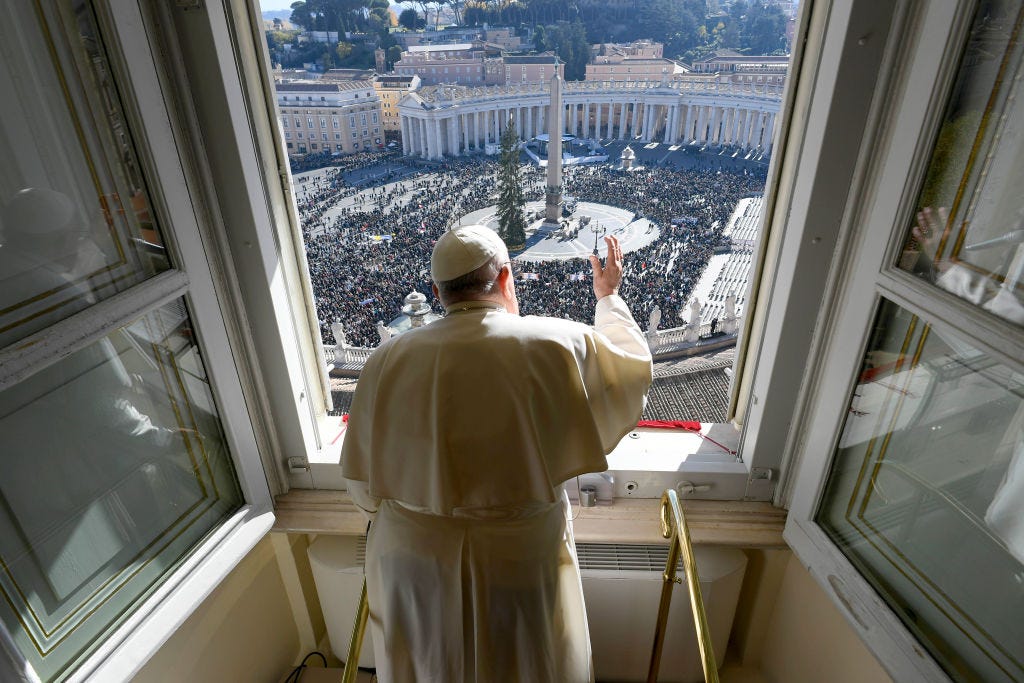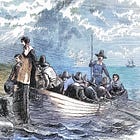A Good Man in a Strongman’s World
Pope Francis had flaws. His emphasis on compassion wasn’t one of them.

The last twelve years have been turbulent. We have witnessed the rapid rise of populist politics, the advent of new, earth-shattering technologies, and the fracturing of a tenuous international peace. Throughout all of the chaos, the Catholic Church has been steered by the firmly gentle hand of Pope Francis. Even as the instability of the twenty-first century bled into religion, Pope Francis attempted to guide the church in the direction of compassion and humility. That he did not always succeed at this task is not entirely surprising and no doubt he could have gone much further. Yet the simple, unadorned goodness of the late Pope is something that will be missed in this age of bombastic cruelty.
Nowhere was the compassion of Pope Francis better displayed than his interaction with children. In 2018, the elderly Pope was approached by a young Italian boy who feared his recently deceased atheist father was in Hell. Many priests would have responded with a long discourse on purgatory or a kind but obfuscating answer. That was not the way of Pope Francis. He took the small child in his arms and whispered words of genuine consolation—affirming that the Church and the Kingdom of Heaven are accepting and forgiving places. Perhaps more importantly, he proclaimed to both this boy and the world that love is the true hallmark of a good life rather than conventional religious belief or legalistic obedience.
Born Jorge Bergoglio in Argentina just before the outbreak of World War II, Francis’ life coincided with a rising crisis of faith brought about by the tragedy of a war-torn world and the apotheosis of materialistic philosophy. As a young man, Bergoglio stepped into the confessional of a church on his way to a celebration. This quiet encounter in the confession box forever altered his life. Upon leaving the church, Bergoglio knew he wished to dedicate his life to his Catholic faith.
After becoming a member of the Jesuit order, Bergoglio rose quickly through the Church hierarchy. In time he would become the head of his order in Argentina and eventually the Archbishop of Buenos Aires. He was finally appointed to the cardinalate in 2001. Throughout his time in Argentina, Bergoglio became a lightning rod for controversy in his many attempts to maintain peace with Argentina’s frequently despotic government. At the same time, Bergoglio earned a reputation for humility and honesty almost unparalleled among bishops in the modern Catholic Church. He forsook the usual trappings of his office and preferred to live in a plain apartment and use public transportation. This reputation for simple Christian wholesomeness helped catapult him to the papacy in 2013.
At the time Francis ascended to the throne of St. Peter, crisis and scandal weighed heavily on the Church. Rocked by seemingly endless sexual assault allegations and with a rapidly declining church membership, the College of Cardinals set the new pope a big task. His predecessor—Pope Benedict XVI—had sought to rejuvenate the Church by helping it return to the great universal truths that had guided it in previous ages. An academic by training, Benedict saw that the rise of moral relativism and the challenge of modern “secular humanist” science posed significant threats to the Church’s teaching. By focusing with great precision and firmness on the intellectual precepts that undergird Christian faith, Benedict believed Christianity could be restored to its former glory. In the end, however, his earnest academic approach—held sacred still by so many high-minded conservative Christians—proved inadequate to the challenges of modernity.
Upon his election, Pope Francis immediately began to chart a different course. Somehow, he intuited that the present crisis of faith is not an intellectual one—not a product of some defective reasoning or wrongly held precept—but a sickness of the heart. The malaise of modernity stems from a frustrated anger at a universe that seems cruel, uncaring, and incapable of fully acknowledging each individual’s unique importance in creation. In short, we humans—who so long to be eternal—have started to feel that in the grand scheme of things we do not matter that much. After all, in the face of artificial intelligence, the global economy, and the vastness of outer space, who amongst us can claim to be special or significant?
Pope Francis worked throughout his papacy to answer this question and refute the painful potentiality of human uselessness. He did so not with great glittering theories but through simple Christian goodness. He lobbied for every single action taken by the Church to be centered on the dignity of all individual souls. For him, this attitude formed the very heart of Chrisitan faith. As he expressed it in his very last homily, delivered the day before his death on Easter Monday, when we look for Christ we find Him everywhere: in the eyes of our fellow man, in the majesty of nature, and in our very selves. To lose faith—as is all too common in an age of doubt—is simply part of the process, an avenue to the joy sparked by rediscovery. In short, for believers and nonbelievers alike, Pope Francis helped to revive the mystery and beauty of a more romantic age.
What Francis took to be the practical implications of this teaching have continued to spark protest. Early on in his papacy, he sought to expunge the Church of any teaching or behavior he deemed exclusionary or elitist. Some of these changes—such as reforming the Vatican Bank—have proved almost universally popular outside the stuffy Roman Curia. Other actions, such as his attempts to make the Church more open to women and sexual minorities, caused many conservatives to label him a heretic unconcerned with longstanding Church teaching. Perhaps as an attempt to avoid alienating right-wing Catholics further, or simply out of frustration with the anti-reform Church bureaucracy, Francis never fully challenged the controversial conventions of Catholic social teaching. Instead, he preferred to dance around the issue and in the end left most unsatisfied with his position.
Also concerning to many, Francis sought to quash the traditional Latin Mass and other liturgies commonly practiced among more conservative congregations. This move revealed a frightening inability to fully comprehend the necessity of pluralism to modern religion. No Church or society in the twenty-first century is likely to be able to foist a singular theology upon a world of highly educated citizens. Instead, toleration of both the liberal and the conservative must be the hallmark of any flourishing church.
Despite these weaknesses, Francis’ approach to faith inspired a generation of Christians—Protestant and Catholic alike—to renew their fading faiths in the light of his unwavering goodness. Whether one is a believer or not, it is impossible not to be moved by the generosity of spirit he constantly showed to the poor and downtrodden. His kindly interactions with migrants, the homeless, the poor, and other outsiders gave the world a shining example of true generosity. In so doing, Pope Francis brought faith to a cynical and disbelieving world. In an age of strongmen he was something far greater and far rarer—a good man.
Jeffery Tyler Syck is an Assistant Professor of Politics and the Director of the Center for Public Service at the University of Pikeville in his native Kentucky.
Follow Persuasion on X, LinkedIn, and YouTube to keep up with our latest articles, podcasts, and events, as well as updates from excellent writers across our network.
And, to receive pieces like this in your inbox and support our work, subscribe below:





A key criticism of Pope Francis’s approach to gay issues is that his rhetorical emphasis on inclusion, dignity, and pastoral care created a misleading impression of change, while in reality, the Church’s official teachings on homosexuality remain unchanged—and remain a powerful weapon in the hands of far-right Catholic activists like Robert P. George, who actively push for legal and social discrimination against gay people.
Francis’s words about welcoming gay people—"Who am I to judge?"—suggested a break from the past, but his refusal to amend the Catechism of the Catholic Church, which still describes homosexual acts as “intrinsically disordered” and of “great depravity,” left those teachings intact as a justification for discrimination. While Francis promoted pastoral outreach, his failure to correct the Catechism’s language allows anti-gay Catholics to continue citing Church doctrine as moral cover for bigotry.
Figures like Robert P. George exploit this doctrinal ambiguity. While Francis preached mercy, George and his ideological allies—including activists at organizations like the National Organization for Marriage and the Ethics and Public Policy Center—argue that Catholic doctrine obligates opposition to gay rights. They lobby against same-sex marriage, support “religious freedom” exemptions that enable discrimination (as does , and oppose non-discrimination protections for gay people. Anti-gay Catholics and Protestants alike secured a victory in 303 Creative LLC v. Elenis, 600 U.S. 570 (2023), where the Supreme Court carved out an exception to public accommodation laws, allowing businesses to deny services to gay people based on religious beliefs under certain circumstances.
Because the Catechism remains unchanged, Francis’s pastoral language served as a rhetorical buffer—offering a softer public face of the Church while still providing theological ammunition to those who want to restrict gay rights. The result is a double game: Francis appeared progressive, but he refused to challenge the very doctrinal framework that justifies anti-LGB discrimination. This strategic ambiguity lets the Church appear compassionate while allowing its most reactionary elements to continue their crusade against gay equality.
Someone said, "We used to listen to politicians and laugh at comedians, and today we listen to comedians and laugh at politicians," regarding populist politics since 2015.
I have a similar experience as an atheist regarding the Pope. It's not about achieving a 100% agreement rate. Regarding opinions on refugees, welfare, and climate, the Pope turned out better than many atheists, including persons as Trump who are Christian in name only.
Rest in Power, together as with Lemmy and others.